
The following is my own opinion, and I know people will disagree. There’s a comment box at the bottom of this article – please use it!
This year, 2009, has seen dramatic change. Longstanding institutions have fallen after years of speculation that they were “unsustainable.” Car companies have declared bankruptcy. Major daily newspapers are on the brink.
I worry collector clubs may be headed in the same direction if we don’t take bold action. I’m a member of two great clubs, TCI and ATCA, and in touch with many others, and for years I’ve heard concerns like these: Our members are getting older. How can we get young people involved? Attendance at shows has dropped, because of high gas prices, etc.
Many clubs originally started for buying and selling, but today serve two main purposes: 1) camaraderie and friendship, and 2) sharing information about the hobby.
Most clubs do fine on camaraderie and friendship. They’re run by dedicated and passionate volunteers, who believe in the hobby and work hard on club business. Whether in an online discussion or in person at a show, most members enjoy the social aspects and do a great job welcoming new people into the hobby.
“What we learned about all those years is just too cool, too interesting, too compelling to keep off the Internet.”
The problem is #2, information sharing. The traditional vehicle has been the club newsletter. Many clubs have published newsletters for decades, chock full of well-researched articles, pictures, and practical advice – everything a new collector would need to start getting excited.
Unfortunately, this information might as well be locked away in Fort Knox. If I’m a teenager or a 30-something starting to get curious about collecting, I go to Google to start my search. I wont find these newsletter archives on Google, because they’re protected behind thick castle walls designed to keep outsiders away! At best, they’re online in a password protected members area. But most likely, they’re in binders at the home of a few longtime club members.
Newsletters are the main member benefit for many clubs, the main justification for the $40 or so annual fee. It wouldn’t be fair to members, the thinking goes, to put the back issues online for free because people have paid years of membership fees to get them. And certainly not current issues – why would you pay the dues if you could just get the newsletter free? The castle walls are the club’s business model.
Some clubs also make money from the newsletter archives by selling them on CD-ROM for say $20. But let’s run the numbers here. If you sell 50 copies a year, that’s $1,000. But that’s 50 people compared to the tens of thousands searching for your hobby on Google.
I happen to know that 12,000 people a month search for “antique telephone” on Google, and this is a small hobby (I’m a telephone collector). 23,000 search for “vintage telephone.” How many of those 35,000 people a month could be converted into telephone collectors if they could dive right into the meat of the hobby? (To get the Google numbers for your hobby, just use Google’s keyword research tool).
I’d like to see clubs put their full newsletter archives online, free and indexable by Google. I believe it would spark dramatic new interest in collecting and growth in collecting clubs, especially among young people. A few members may not agree, “but its for the future of the club,” you just have to tell them. “What we learned and wrote about all those years is just too cool, too interesting, too compelling to keep off the Internet, behind castle walls and away from the next generation.”
As for current issues, there’s a strong argument for putting those online too. Most media publications put their content online for free, and that’s what people have come to expect. And it costs a whole lot less than printing and mailing.
My bottom line: if we don’t take down our castle walls and put our collecting crown jewels online, young people will never know how great our hobbies are, and will instead pursue some other, non-collecting interest. If we do put this great stuff online, the sky’s the limit!
Your thoughts?
 The High Price of a Degree in LSD
The High Price of a Degree in LSD Nobel Prize Medals: History, Specifics and Auction Records
Nobel Prize Medals: History, Specifics and Auction Records Yakity-Yak: 60 Years of Teeth That Talk Back
Yakity-Yak: 60 Years of Teeth That Talk Back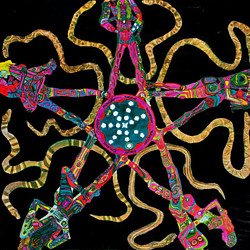 Mari Tepper: Laying it on the Line
Mari Tepper: Laying it on the Line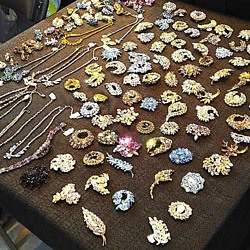 Nice Ice: Valerie Hammond on the Genteel Charm of Vintage Canadian Costume Jewelry
Nice Ice: Valerie Hammond on the Genteel Charm of Vintage Canadian Costume Jewelry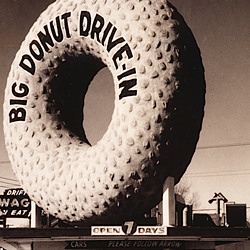 How Jim Heimann Got Crazy for California Architecture
How Jim Heimann Got Crazy for California Architecture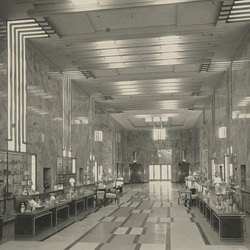 Modernist Man: Jock Peters May Be the Most Influential Architect You've Never Heard Of
Modernist Man: Jock Peters May Be the Most Influential Architect You've Never Heard Of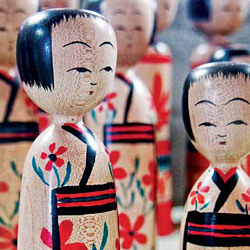 Meet Cute: Were Kokeshi Dolls the Models for Hello Kitty, Pokemon, and Be@rbrick?
Meet Cute: Were Kokeshi Dolls the Models for Hello Kitty, Pokemon, and Be@rbrick?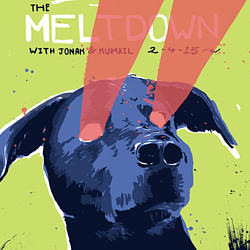 When the King of Comedy Posters Set His Surreal Sights on the World of Rock 'n' Roll
When the King of Comedy Posters Set His Surreal Sights on the World of Rock 'n' Roll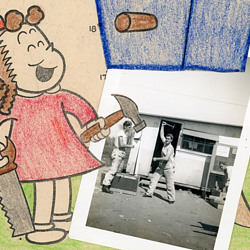 How One Artist Makes New Art From Old Coloring Books and Found Photos
How One Artist Makes New Art From Old Coloring Books and Found Photos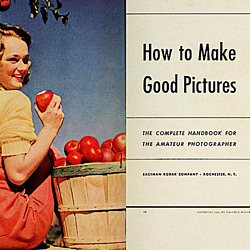 Say Cheese! How Bad Photography Has Changed Our Definition of Good Pictures
Say Cheese! How Bad Photography Has Changed Our Definition of Good Pictures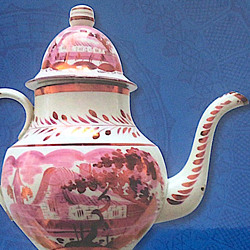 Middle Earthenware: One Family's Quest to Reclaim Its Place in British Pottery History
Middle Earthenware: One Family's Quest to Reclaim Its Place in British Pottery History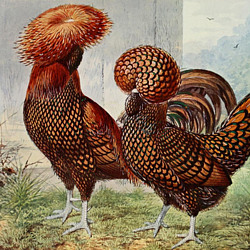 Fancy Fowl: How an Evil Sea Captain and a Beloved Queen Made the World Crave KFC
Fancy Fowl: How an Evil Sea Captain and a Beloved Queen Made the World Crave KFC
I,m a member of the nawcc.the organization is getting very expensive.and too few people are hoarding too many historical artifacts let alone run of the mill stuff.not to say the quality of alot of these artifacts are just so very well made.i think more of us older members should be a little more helpful to our newer members and not so profit driven george
Wow that sounds like a good thing.I do use Google and this site and anything else I think may help understanding my collectibles and if I should keep them sell them or donate them. I have found a lot of young people under 40 who are really into vintage and older items. So lets open these things up for all.
After all we would not keep reading, writing , and math from anyone. Why this? I understand if someone does not want to sell that’s fine But gosh If you have something that is history and and artifact by all means make it known in your will who will take care it , not sell it but donate to a museum.
It is so important to share our knowledge, so I’m in total agreement with the author. What good does it do to keep the information away from the general public? It certainly does nothing to gain their interest! The more that is available, the more likely it is to entice someone to start a collection. For those who are in the clubs for collecting and/or selling, you’ll gain a much wider audience that way, perhaps resulting in greater friendships, more “penpals” AND, more sales. Nothing is gained by keeping people out, except hoards of people who have no appreciation for the age, history, and beauty of such things as old silver, buying it for scrap. I shudder how much magnificent silver is being bought and sold for the melting pot.
I agree with these comments. I am the President of the American Cut Glass Association, 1,500 members strong and collecting American Brilliant Period Cut Glass produced between 1880 and 1920. Unless we interest the youth of our nation in our glass we will eventually wither away to nothing. This IS so very, very difficult because, just as Dave suggests, we tend to hide our knowledge–actually our only drawing card–behind the walls to which he alludes.
Let’s wake up collectors and do what the kids do…get with it, dude!
I’m all for freely sharing information. But I wonder, how much is really hidden from public view? Which clubs need to “tear down their walls”?
Good concept – all true BUT how do the clubs survive without revenue? Our publication, which is very reasonable ($20 a year, full magazine format in B&W containing 24 pages), pays for itself in dues. Many of our members are still not online so we need to produce hard copy which of course costs money. If we put everything on our website it would make no sense because we would still have to produce a few newsletters to send by mail and why should those members have to pay for more than the postage?. We would not be able to produce the newsletter without some revenue.
We periodically add a few interesting articles to our website for the general public with the hope that this will attract them as members. If it doesn’t, then they probably wouldn’t join anyway.
Attracting younger people to hobby collecting is an issue. It is just a completely different world out there now with much less interest in collecting things of the past. It will come around again, it traditionally does!
A club officer (name witheld by request) emailed in the following comment:
Assuming a club uses full member names in their newsletter, placing
complete newsletters online is just inviting thieves to target your members.
I’d like to suggest something similar to posting newsletters online but
modified to protect the homes, families, and collections of individuals.
Newletter editors could place articles on line, but not entire newsletters.
That would combine the benefit of information sharing with some protection
for individuals.
As the current editor/publisher of a bi-monthly collector’s magazine and the former one of another – I agree. The former magazine, for the time I was editor/publisher, was put totally online (by me because I was also the webmaster). My “trick” was for the unlinked articles (which were accessible as sample articles for each issue) to just upload the material, let the Google spider bots “crawl” it and then create their own link. That way, someone specifically searching the information would get it as a linked match through Google (or whatever they used to search) but not necessarily open to everyone. That way, the organization’s publication articles were not accessible in leiu of being a member and receiving them first hand, which solved that problem, nor open to everyone for author’s details. Plus, there IS a way to upload whatever you need without including member’s specific information, so that solves that too. Plus, I uploaded them on one issue’s delay. I do the same with my current magazine’s articles and will continue to do so.
If we withhold information from the potential collector, then where will they get the info? Many do not have a local club near enough to visit for each meeting. Some may work during meeting hours and can’t attend, but this would still keep them in touch. If younger collectors can’t get the info, perhaps their interest would die – and then where will the seasoned collectors of the future come from?
In the front of my magazine, it states clearly that the publication is for the information purposes to further the hobby, “written by and for collectors.” And I smile every time I attend a show to give away samples and watch someone go balistic because they didn’t know it existed as I watch them go through my box to see what other back issues I have with me they can take.
Some collectors do so for the sake of collecting only. They don’t care of X Bottling Co. was in business for X number of years here, or there – they just want to collect – and not be bothered reading about it And that’s all they will ever do. But there ARE those who want to know where the bottle they just bought, dug or found came from and what it’s history is – and I am a firm believer that the information should be there for those ones. And I want to do whatever I can for them, and to help the clubs stay healthy and strong.
Just my two cents worth.
Your article is interesting and from my perspective, A Bulls eye.
As a member of VCCA {Vintage Chevrolet Club of America} a 30+ year old club with about 7,800 members, primarily in the U.S. Your article hits three key points. One, wrap your arms around technology folks because it is here and it is wonderful. Two, it’s not the sharing {which VCCA does a pretty good job of} it’s the “mindset” of members that allows this to happen. Three, members MUST be open, willing & support CHANGE. THAT dirty, difficult and painful 6 letter word that so many discuss but so few make happen.
I had another though while reading your article, “openness.” As in clubs expanding to allow different vehicles. VCCA’s mantra is, “Dedicated to the restoration and preservation of all Chevrolets.” But a narrower platform can leave out a lot of potential members who made slight modifications to cars. VCCA has met this challenge by opening up and allowing ALL Chevrolets, new, old or modified.
But this concept/plan is not enough. The idea MUST be willingly and openly DISCUSSED as a positive by all members of a club to potential members.
So the mind set of all clubs MUST be {as you say} get involved 150% with technology. Two, share information openly to ALL who can gain from it. Three, be open to more types of cars or versions of them in the club. So while mantra’s are fine they are going to have to be modified if a club wants to expand and meet the needs of TOMORROWS members.
VCCA has improved in each of these areas {check out VCCA.ORG for more info} thus we are, growing and will prosper because we are now planning for tomorrow and making each step happen.
As I see car clubs the bottom line is people. People join they and support them. If either one of these indicators slows or stops, the club MUST IMMEDIATELY view the slow down as a barometer of how the club is meeting, or NOT meeting the needs of people.
Thanks for the great article,
Michael Welch
VCCA Member
Check out the Willamette Coin Club’s online web site http://www.pdxcoinclub.org and go to: “Member Activities”
There are numerous articles and interesting photos that are shared for all to see. We keep our membership inexpensive as we rely upon income from our coin shows and interest from doing one ANA Convention (1998) and two National Money Shows (2004 and 2009). We have a club drawing every month and a member only drawing each month. While this is not unique it becomes more relevant as we highlight the whys and wherefores on the numismatic items in the auction. This further enhances the educational aspect not just the ” I won something” factor.
People join clubs for many reasons, entertainment value should not be disregarded. We have been fortunate to have folks that collect a wide variety of numismatic material from tokens, books, US coinage, foreign coinage, currency, ancient coins and many others. We teach each other and rely upon each other for knowledge, or the place to find it.
Our “links” section directs folk to many web addresses and data bases that are thouroughly useful. We don’t have a “Face Book” page yet; I think that is very close. Our club motto is: “This is my hobby, I do it for fun.” And we do.
A word of warning. When we first put our coin club info on the web, we had an unpleasant incident. A nut-case radio personality came (wired up) and disrupted the meeting. We had to kick him out of the meeting. I never understood how that was supposed to be funny. Anyways, this upset the members, particularly the elderly ones. Hence, we have left out the details of meeting location (room number). Instead we feel we have to screen internet inquiries for security reasons. See our website for the Pacific Coast Numismatic Society at http://www.pcns.org
technology ok but I have been searching for info about Emerson radio’s and have run into brick walls first the sites need to be for ole timers who are less than semi-literate in iron-box use my frustration meter is burned out and with this in mind the following comes to the front how can we pass the info if we can not communicate? any Emerson radio people please conntact me at albertbbruno@aol.com